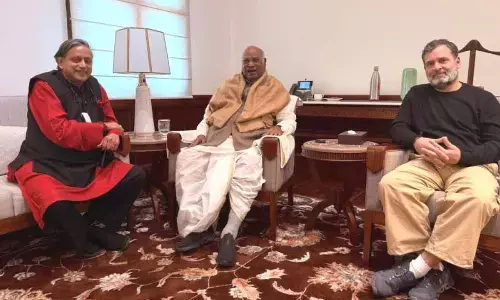A stunning comeback for Netanyahu

Benjamin Netanyahu
Netanyahu has been defying the political obituary writers for years. He did so after his reelection defeat in 1999, then again following a humiliating loss in the 2006 elections. His right-wing Likud Party will rule in a coalition with ultra-nationalist and ultra-Orthodox partners. Not only are the policies of his allies alarming to the international community and to many Israelis and Palestinians, they also promise to give Netanyahu endless headaches in his next term in office
Washington (The Conversation): Israel's political magician has done it again. Having been turned out of office in 2021 as the first sitting Israeli Prime Minister to be indicted – and with his corruption trial still underway – Benjamin Netanyahu has made another stunning comeback.
After four inconclusive elections in just four years, a fifth national vote on November 1 saw Israelis hand Netanyahu's right-wing bloc a decisive victory. In some ways, it shouldn't come as a big surprise. Netanyahu has been defying the political obituary writers for years. He did so after his reelection defeat in 1999, then again following a humiliating loss in the 2006 elections. Now, the pundits who declared Netanyahu's career over after he lost the premiership last year to political rivals Naftali Bennett and Yair Lapid have been proved wrong.
Netanyahu's win means the deadlock that had paralysed Israel for nearly four years may be finally over, given his now 64-seat majority. His right-wing Likud Party will rule in a coalition with ultra-nationalist and ultra-Orthodox partners. The radical agenda of one of these parties, the far-right Religious Zionist Party, includes the unfettered expansion of Jewish settlements in the West Bank, which it seeks to annex; enabling soldiers to shoot at Palestinian assailants without prior authorisation from their superiors, as is the rule now; expelling "disloyal" Arab citizens from their homes in Israel; and allowing Jewish prayer on the Temple Mount – an act seen by Muslims as a provocation given the arrangement that for decades has permitted Jews to visit but not to pray at their al-Aqsa Mosque compound. The party is also deeply conservative on social issues, calling for a rollback of gay rights by banning, for example, the Jerusalem Pride parade. Not only are such policies alarming to the international community and to many Israelis and Palestinians, they also promise to give Netanyahu endless headaches in his next term in office.
Although he has long been Israel's leading right-wing politician, Netanyahu does not share the far-right, religious ideology of some of his new political allies. To be sure, Netanyahu has a conservative worldview. Yet, he also is a secular, pragmatic and risk-averse politician. His flexibility has been displayed on numerous occasions over the years. In his first term, he continued the Oslo peace process he had fiercely criticised as leader of the opposition, signing the Hebron Protocol and Wye River Memorandum that led to the Israeli withdrawal from territories in the West Bank. He voted three times for the 2005 unilateral disengagement from the Gaza Strip – before then resigning in opposition to the withdrawal. And in June 2009, he abandoned his lifelong opposition to a Palestinian state by publicly endorsing the two-state solution. Again, he later reversed his position. Netanyahu also acceded to President Barack Obama's demand in 2009 for a 10-month freeze in Jewish settlement construction to restart peace talks – negotiations that ultimately collapsed on his watch.
But with pro- and anti-Netanyahu blocs now firmly entrenched in Israeli politics, Netanyahu has no real choice but to form an ideologically narrow, far-right coalition. Indeed, the emergence of the extreme-right that he now courts is a monster largely of Netanyahu's own creation. As Israeli society has drifted to the right, becoming more religious and conservative, Netanyahu has increasingly stoked discord between the right and the left to expand his base. In 2019, Netanyahu, seeking to shore up his right-wing bloc, orchestrated a merger between two far-right parties: Ben-Gvir's Jewish Power and Yamina, led by Bezalel Smotrich. The new party, the Religious Zionists, which also included the ultra-conservative Noam faction, ensured that far-right representatives were able to cross the electoral threshold and make it into the Knesset – Israel's parliament.
Driven by his political survival instincts, in other words, Netanyahu ensured that right-wing votes would not be "lost" by failing to reach the threshold needed for representation. In so doing, he also legitimised Ben-Gvir's extremist party and helped make it mainstream practically overnight.
As a harbinger of potential discord, Netanyahu has already indicated that his government will not alter the status quo regarding LGBTQ rights to accommodate the homophobic agenda of the Religious Zionists. Preserving Israel's fragile democracy while pursuing his own political and personal interests may prove to be a colossal challenge – one that even a political magician like Netanyahu may find insurmountable.










